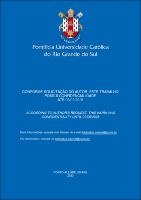| Share record |


|
Please use this identifier to cite or link to this item:
https://tede2.pucrs.br/tede2/handle/tede/10613| Document type: | Tese |
| Title: | Estudo do papel da via da p38/MAPK no crescimento dos gliomas in vitro |
| Author: | Grave, Nathália  |
| Advisor: | Morrone, Fernanda Bueno |
| Abstract (native): | Os gliomas constituem um grupo heterogêneo de tumores do sistema nervoso central (SNC), sendo os mais agressivos e letais entre os tumores primários. O glioblastoma multiforme (GBM), o subtipo mais comum em adultos, apresenta um prognóstico ruim devido às altas taxas de recorrência do tumor, bem como à sua resistência aos tratamentos convencionais, como a quimioterapia e radioterapia. Embora ainda não estejam totalmente compreendidas, sabe-se que mutações em importantes redes regulatórias estão relacionadas ao surgimento dos gliomas. Uma das mais importantes vias de regulação da gênese e progressão dos gliomas é a via das proteínas quinases ativadas por mitógenos (MAPKs). Dentre estas, a via da p38/MAPK esta implicada em efeitos antagônicos como a proliferação e a sobrevivência celular. Tendo em vista estes achados bem como a necessidade de buscar novos alvos terapêuticos para os gliomas, este trabalho teve como objetivo estudar o papel da inibição da via p38/MAPK no crescimento dos gliomas in vitro. Para isto, foram utilizadas linhagens celulares de glioma e culturas primárias de glioma humano. Estas foram tratadas com os inibidores seletivos da via, skepinone-L e ML3403, e/ou o agente alquilante temozolamida (TMZ) (100μM) e posteriormente irradiadas (2 Gy). Foram avaliados os efeitos sobre viabilidade e proliferação celular, formação de colônias e ciclo e morte celular em diferentes tempos (24 e 48 h). Os resultados mostraram que o inibidor skepinone-L em diferentes concentrações, em tratamento único ou associado, diminuiu a viabilidade e proliferação celular, e reduziu os potenciais de formação de colônias nas células de glioma estudadas. Este efeito, no entanto, não foi capaz de sensibilizar as células quando tratadas em associação ao TMZ. Verificou-se ainda alterações a nivel de ciclo celular, com um arraste nas fases S e G2, e um aumento do percentual de células em apoptose tardia/necrose frente aos tratamentos utilizados. Os resultados com o inibidor ML3403 mostraram uma redução na proliferação celular, sensibilizou as células radiorresistentes quando tratado em combinação com irradiação, alterou a progressão do ciclo celular e aumentou a apoptose nas linhagens. Dessa forma, diante dos resultados obtidos de redução no crescimento das células estudadas, a inibição da via da p38/MAPK apresenta-se como um potencial alvo para o tratamento dos gliomas. Outros estudos são necessários para compreender melhor seu papel no microambiente tumoral do glioblastoma. |
| Abstract (english): | Gliomas constitute a heterogeneous group of central nervous system (CNS) tumors, being the most aggressive and lethal among primary tumors. Glioblastoma multiforme (GBM), the most common subtype in adults, has a poor prognosis due to the tumor's high recurrence rates, as well as its resistance to conventional treatments such as chemotherapy and radiotherapy. Although they are still not fully understood, it is known that mutations in important regulatory networks are related to the appearance of gliomas. One of the most important pathways regulating the genesis and progression of gliomas is the mitogen-activated protein kinases (MAPKs) pathway. Among these, the p38/MAPK pathway is implicated in antagonistic effects such as cell proliferation and survival. In view of these findings, as well as the need to seek new therapeutic targets for gliomas, this study aimed to investigate the role of the p38/MAPK pathway inhibition in the growth of gliomas in vitro. For this, glioma cell lines and primary cultures of human glioma were used. These were treated with the selectives inhibitors of the pathway, skepinone-L and ML3403, and/or the alkylating agent temozolamide (TMZ) (100 μM) and subsequently irradiated (2 Gy). The effects on cell viability and proliferation, colony formation and cell cycle and death at different times (24 and 48 h) were evaluated. The results showed that the skepinone-L inhibitor at different concentrations, in single or combined treatment, decreased cell viability and proliferation, and reduced the potential for colony formation in the studied glioma cells. This effect, however, was not able to sensitize the cells when treated in association with TMZ. There were also alterations in the cell cycle, with a delay in the S and G2 phases, and an increase in the percentage of cells in late apoptosis/necrosis compared to the treatments used. Results with the p38 inhibitor ML3403 showed a reduction in cell proliferation, it sensitized radioresistant cells when treated in combination with irradiation, altered cell cycle progression, and increased apoptosis in glioma cell lines. Thus, in view of the results obtained regarding the reduction in the growth of the studied cells, the inhibition of the p38/MAPK pathway appears as a potential target for the treatment of gliomas. Further studies are needed to better understand its role in the glioblastoma tumor microenvironment. |
| Keywords: | Glioblastoma Multiforme MAPKs p38 Glioblastoma Multiforme MAPKs p38 |
| CNPQ Knowledge Areas: | CIENCIAS DA SAUDE::MEDICINA |
| Language: | por |
| Country: | Brasil |
| Publisher: | Pontifícia Universidade Católica do Rio Grande do Sul |
| Institution Acronym: | PUCRS |
| Department: | Escola de Medicina |
| Program: | Programa de Pós-Graduação em Medicina e Ciências da Saúde |
| Access type: | Acesso Aberto |
| Fulltext access restriction: | Trabalho será publicado como artigo ou livro |
| Time to release fulltext: | 60 meses |
| Date to release fulltext: | 06/02/2028 |
| URI: | https://tede2.pucrs.br/tede2/handle/tede/10613 |
| Issue Date: | 21-Dec-2022 |
| Appears in Collections: | Programa de Pós-Graduação em Medicina e Ciências da Saúde |
Files in This Item:
| File | Description | Size | Format | |
|---|---|---|---|---|
| TES_NATHALIA_GRAVE_CONFIDENCIAL.pdf | NATHALIA_GRAVE_TES | 540.65 kB | Adobe PDF |  Download/Open Preview |
Items in DSpace are protected by copyright, with all rights reserved, unless otherwise indicated.




